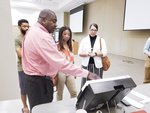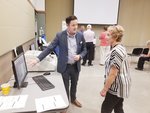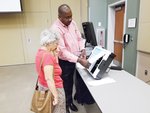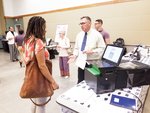



Chatham County will be purchasing new voting equipment and may be testing it in at least one precinct during upcoming municipal elections.
The purchase to replace 30 standard voting machines and 30 ADA accessible machines comes just after the State Board of Elections certified three new equipment machine providers, despite some controversy. Paschal noted that the county’s decision to purchase equipment just “happened to be when” the state decided to certify the companies, and the lifespan of the county’s current machines has come to an end.
State law requires that any county purchasing new machines must hold a public demonstration of potential equipment that it is considering. The Chatham County Board of Elections held its public demonstration two weeks ago with all three vendors at the Chatham County Agriculture and Conference Center. Paschal said the demonstration was an “opportunity for the [Chatham County Elections] board and the citizens to see the equipment and ask questions.” She noted that approximately 25 people showed up for the event including Chatham County Commissioners Diana Hales and Karen Howard.
The following day, the Chatham County Board of Elections held a special meeting to discuss the pros and cons of each vendor’s equipment. The staff recommended the Hart InterCivic machine, which uses hand-marked ballots. In a 4-1 vote, the board agreed with the staff’s recommendation.
The board’s recommendation will now make its way to the Chatham County Board of Commissioners for consideration. Under state law, any equipment being used for the first time in a county requires a test run in at least one precinct prior to the 2020 midterms. Paschal is hoping Chatham County will be able to have all the equipment up and running for the municipal elections in November.
In 2005, the N.C. General Assembly passed a law that mandated voter-verified paper ballots, a security review of the source code of all voting systems and random audits. Following passage of the law, only Nebraska-based Election Systems & Software (ES&S) retained certification to provide election equipment in the state,
At that time, Chatham County used a combination of equipment, according to Paschal — voters used a touch-screen machine during early voting and hand-marked ballots fed into a scanner on election day. Several years later, the county moved to use the ballot scanner for all voting. The touch-screen machines were phased out in Chatham but are currently in use by other counties in North Carolina. The state legislature mandated that those machines will be decertified as of Dec. 1 of this year. Because of that, numerous counties are also in the market for new equipment.
For more than two years, the North Carolina Board of Elections has been working to certify ES&S and two additional companies, Clear Ballot and Hart InterCivic. Both Clear Ballot and Hart InterCivic sell machines that utilizes hand-marked ballots which are scanned and viewable by the voter. The voter is then able to review their ballot to ensure the device accurately logged their votes. ES&S’s equipment utilizes a “ballot-marking device” which means that the machine marks the paper ballot rather than the voter using a pen to mark it themselves. In addition, the ES&S equipment does not print a full-faced ballot for the voter, but rather it prints a “barcode ballot” which uses barcodes to record votes.
Voting advocates have been active during the certification process arguing that the ES&S models do not provide the voter with a true “voter verified” ballot. Despite the controversy and the public comment throughout the certification process, the N.C. Board of Elections voted 3-2 last month, with Chairman Damon Circosta, who was appointed by N.C. Governor Roy Cooper, siding with the Republican members of the board to certify all three companies.
In a communication to the N.C. State Board of Elections in August, Hart InterCivic President and CEO Phillip Braithwaite said the equipment has “successfully achieved eight federal certifications by the U.S. Election Assistance Commission and has been thoroughly tested and certified in 19 states.”
He also noted that the company also provides a “ballot-marking” device for voters with disabilities, but that the device “generates a full-size printed ballot that is identical to all other ballots marked by hand.”
Casey Mann can be reached at CaseyMann@Chathamnr.com.